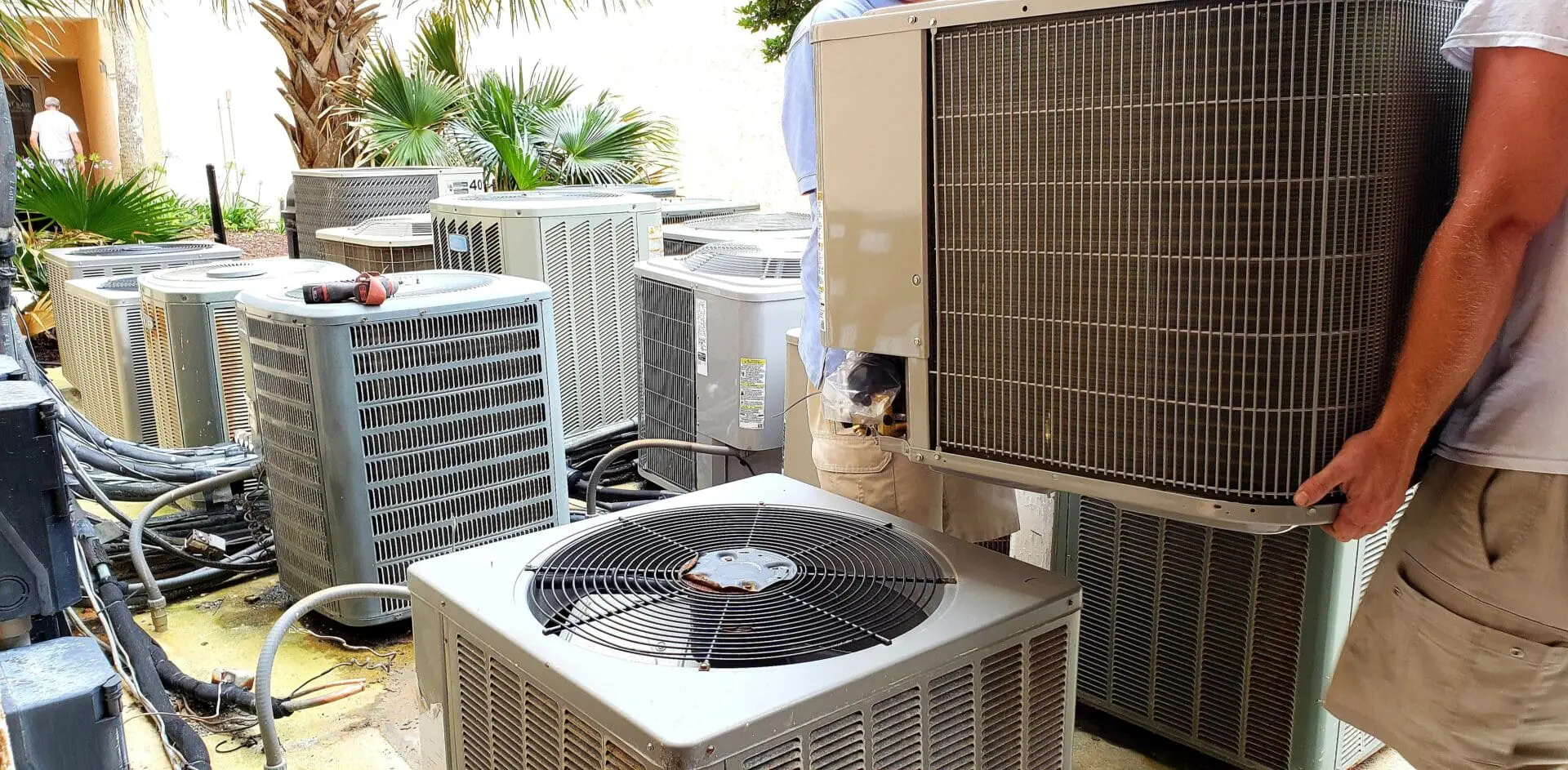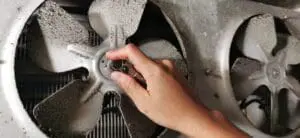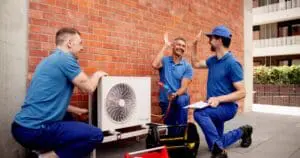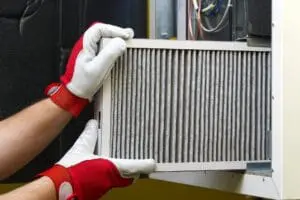Running a commercial building means juggling a ton of moving parts, from keeping employees comfortable to ensuring customers have a positive experience. When the HVAC system starts acting up, it doesn’t just disrupt comfort; it can slow productivity, drive up costs, and even damage equipment.
That’s where HVAC troubleshooting comes in. Knowing how to spot and fix problems early gives facility managers and business owners an advantage. Instead of waiting for a complete breakdown, you can address minor issues before they turn into expensive repairs and keep your building running smoothly.
At Andrew’s, we’re here to help Arizona homeowners identify seven of the most common HVAC issues and how to fix them before calling in a professional.
Table of Contents
Why HVAC Troubleshooting Matters for Commercial Systems
First, let’s go over why HVAC troubleshooting matters for a business. When a commercial HVAC system struggles, it can affect energy bills, employee comfort, and even customer satisfaction.
Learning to recognize and respond to problems can:
- Reduce costly repairs by addressing issues before they escalate.
- Improve energy efficiency and keep utility bills under control.
- Extend the lifespan of your heating and cooling equipment.
- Maintain indoor air quality for a healthier workplace.
- Prevent unexpected shutdowns that disrupt operations.
By understanding the most common issues, you’ll be better equipped to handle them before they turn into emergencies.
The 7 Most Common Commercial HVAC Issues & How to Fix Them
Commercial HVAC systems are complex, but most problems fall into familiar categories. This section works as a practical HVAC troubleshooting guide, outlining the most common issues you’ll encounter, their likely causes, and the steps you can take to address them.
1. Uneven Heating or Cooling
Few things frustrate people faster than working in a building where one room feels like a sauna while the next feels like a freezer. If one side of the building is too warm while the other feels cold, it usually points to airflow or thermostat problems.
Common culprits behind this often include blocked vents, a faulty or miscalibrated thermostat, or leaky ductwork that allows conditioned air to escape. In larger facilities, the issue can also stem from poor zoning design.
When troubleshooting, begin by checking that vents and registers are open and unobstructed. Next, confirm that the thermostats are working correctly and are placed in areas that accurately reflect the true room temperatures.
If the problem persists, schedule a ductwork inspection or consult an HVAC contractor to evaluate whether zoning upgrades are needed.
2. Poor Airflow
Weak or inconsistent airflow makes even a properly sized system struggle to keep occupants comfortable. In many cases, the issue is related to basic maintenance.
Common causes include dirty filters, blocked ducts, or mechanical failures such as a blower motor or belt problem. Start with the simple fix: check and replace clogged filters. If that doesn’t resolve the issue, inspect ducts for blockages or collapsed sections.
Ongoing airflow problems often require a commercial HVAC repair technician to identify whether the blower system is at fault.
3. Strange Noises from the System
Your HVAC system shouldn’t double as a noise machine. When banging, squealing, or grinding sounds start coming from the equipment, it’s usually a sign that something mechanical is wearing out or out of place.
Most strange noises can be traced back to a few common culprits: loose components, failing motor bearings, or worn belts. Sometimes it can even come from debris lodged in the system, which creates a rattling sound.
It’s fine to check for simple obstructions around vents or panels during troubleshooting, but any internal mechanical noises deserve immediate attention. If the sound continues after basic checks, schedule service with a technician right away. Addressing the issue early prevents small parts from causing larger, more expensive damage.
4. HVAC System Not Turning On
It’s never a good feeling when your HVAC system is not working right when you need it most. In many large commercial setups, the issue often comes down to a power problem, and sometimes the solution is simpler than you’d expect.
The causes behind this problem often include a tripped circuit breaker, a faulty thermostat, or issues with your electrical wiring. Start by confirming the breaker hasn’t tripped and that the thermostat is set correctly.
If those are in order and the system still won’t engage, it’s time for a professional diagnosis. Always remember: electrical issues should always be handled by trained technicians for both safety and accuracy.
5. High Humidity Levels Indoors
Staying comfortable isn’t just about keeping the temperature right. If humidity levels spike, the air starts to feel heavy, sticky, and downright unpleasant. When humidity levels climb, employees may feel sticky, and the building can develop musty odors or even mold growth.
This problem typically indicates dirty evaporator coils, clogged condensate drains, or undersized equipment that struggles to keep up. Begin by checking for visible drainage issues and ensuring coils are clean.
When humidity issues don’t go away, it usually points to a design problem that needs a technician’s attention. Extra moisture can also affect other parts of the building, so it’s a good idea to check in with plumbing experts if you notice leaks or drainage backups.
6. Rising Energy Bills
An unexpected spike in utility costs is often the first warning sign that your HVAC system isn’t running efficiently. A system forced to work harder than normal burns extra energy to maintain comfort.
Possible reasons include dirty filters, leaking ducts, outdated equipment, or a thermostat that’s not reading temperatures accurately.
Begin with basic maintenance: change filters and schedule duct inspections. If bills continue to climb, it may be time to consider system upgrades or targeted commercial HVAC repair.
7. Frequent Cycling On and Off
Short cycling, when the system turns on and off more often than normal, puts unnecessary stress on equipment and often signals an underlying issue.
Causes include oversized units, malfunctioning thermostats, or refrigerant imbalances. While you can check thermostat settings, resolving refrigerant or sizing issues requires a professional’s expertise. Continuous short cycling not only reduces comfort but also shortens the lifespan of the entire system.
Seeing These Signs?
Don’t ignore the warning signs. Contact HVAC professional today!
Preventive HVAC Maintenance Tips
The best way to avoid major repairs is by taking a proactive approach. Following simple HVAC maintenance tips helps catch minor issues before they turn into major expenses and keeps your system running at peak efficiency year-round.
Regular Filter Replacement
Filters are the first line of defense for indoor air quality and equipment protection. Dirty filters restrict airflow, forcing the system to work harder and raising energy costs. Replacing filters on schedule is one of the simplest and most effective ways to keep equipment healthy.
Seasonal Inspections
Every season brings new demands on your HVAC system. Having a technician perform inspections before peak heating or cooling months ensures your equipment is ready for heavy use. Inspections also provide a chance to identify worn parts early, avoiding costly emergency repairs later.
Cleaning Coils and Ducts
Dust, dirt, and debris naturally build up inside coils and ducts over time. Left unaddressed, this buildup reduces efficiency and can affect indoor air quality. Periodic restaurant equipment and HVAC coil cleaning keeps systems running smoothly and improves long-term performance.
Schedule Professional Tune-ups
Even with in-house maintenance, scheduling regular tune-ups with a qualified technician is crucial. These visits include detailed system checks, calibrations, and efficiency adjustments that extend the life of your investment. They also provide peace of mind that your building’s comfort is in expert hands.
Why Faucet Leaks Are Costlier in Commercial Settings
A leaking faucet in a commercial building doesn’t just waste water; it threatens the integrity of your property, your budget, and your reputation. Here’s why even a small leak can have serious consequences in a business setting:
When to Call a Professional HVAC Technician
Troubleshooting can resolve many minor issues, but some problems require professional attention. Knowing when to make the call helps prevent costly breakdowns and protects your investment.
Persistent Issues
If the same problem keeps returning no matter what steps you take, it’s a sign that a deeper issue is at play and needs professional diagnosis.
Unusual Noises or Smells
Grinding sounds, burning odors, or musty smells should never be ignored. They often point to mechanical wear, electrical problems, or mold growth inside the system.
Poor Air Quality
When employees or customers complain about stuffy or dusty air, it may be tied to duct problems, dirty coils, or failing ventilation equipment.
System Won’t Start or Keeps Shutting Down
Repeated failures to power on or sudden shutdowns are red flags for electrical or refrigerant issues. These require a technician to safely test and repair.
Rapidly Rising Energy Bills
If your energy costs are climbing despite routine maintenance, hidden inefficiencies may be at fault. A professional can pinpoint the cause and recommend solutions.
Refrigerant Leaks
Refrigerant is hazardous to handle and requires specialized training and certification. If you notice leaks or ice buildup on lines, call a technician immediately to prevent costly water damage.
Safety Concerns
Anything that poses a risk to occupants, such as exposed wiring, electrical sparks, or overheating equipment, warrants immediate service.
Warranty Protection
Many commercial HVAC warranties require documented professional service. Skipping this step can void coverage, leaving you responsible for significant repair costs.
Keep Your Commercial HVAC Running Smoothly
A reliable HVAC system is critical to keeping your business comfortable, efficient, and safe. With consistent maintenance and prompt troubleshooting, you can avoid costly breakdowns and extend the life of your equipment.
If you’re interested in protecting your property beyond HVAC, take a look at our commercial equipment and ice machine repair services. From HVAC to plumbing, Andrew’s is proud to provide trusted support for Arizona businesses.




